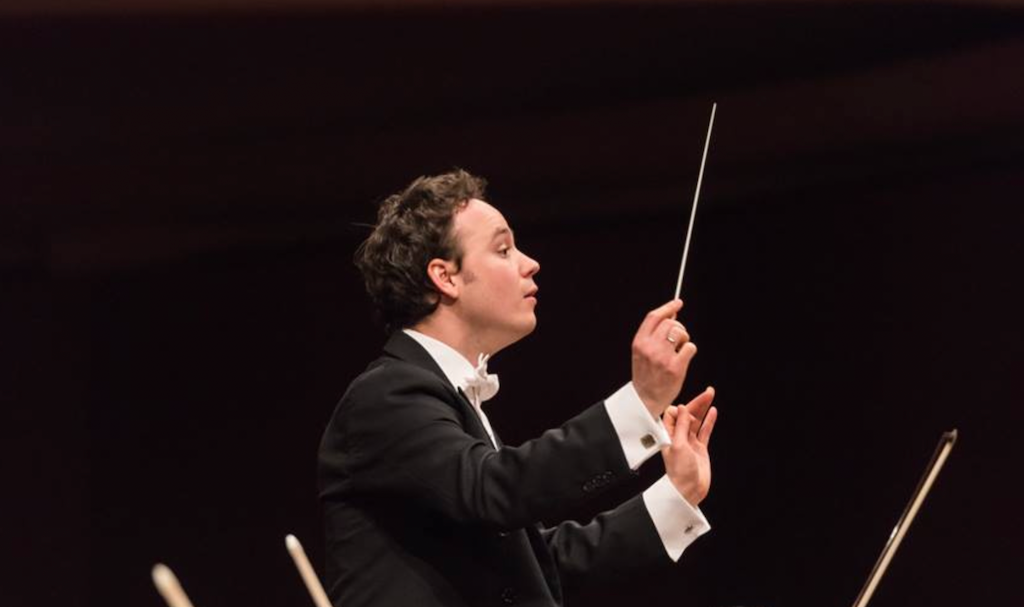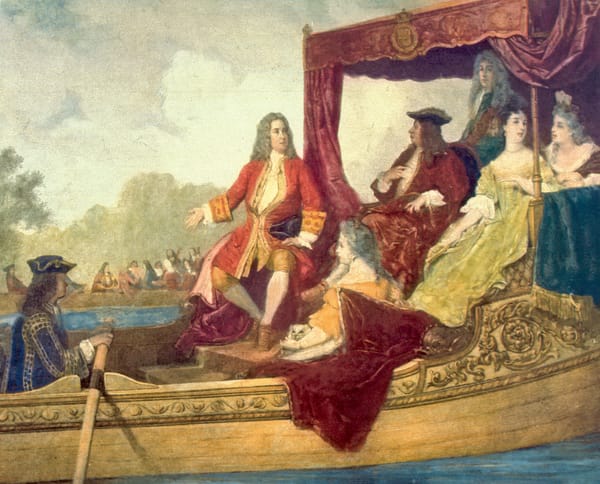Brilliance, Manifold

The SOI Spring 2024 Season brims with the beauty of orchestral music featuring the return of beloved artistes and the India debut of a Grammy Award-winning mezzo-soprano, a celebrated conductor, and a masterful cellist. We speak to Gergely Madaras, Sasha Cooke and Bryan Cheng ahead of their debut at the NCPA.
Soak in the sunny Italian landscape with Mendelssohn’s Fourth Symphony. Journey through lush fields and babbling brooks into the heart of a joyful village celebration with Beethoven’s much-loved ‘Pastoral’ Symphony. The SOI Spring 2024 Season is here and whether you are a seasoned listener or first-time concertgoer, the repertoire, artistry and line-up are sure to delight.
Gergely Madaras, conductor
Hungarian conductor Gergely Madaras is adored for his tender instincts to draw out varying colours and moods with the orchestras he works with. From engagements with the London Philharmonic and BBC Symphony and Philharmonic orchestras, to performing and recording with the Orchestre Philharmonique Royal de Liège across Europe and South America in his role as Music Director, Madaras is a young, burgeoning force to reckon with. He is proficient in classical and Romantic symphonic repertoire, just as much as he is in contemporary music, channelling both with poignancy. Back in 2012, he was named the inaugural Sir Charles Mackerras Fellow at the English National Opera which culminated in his operatic debut at the London Coliseum with Die Zauberflöte; Madaras has since established a solid reputation with La bohème and La traviata, among other acclaimed productions.
Born in Budapest, Hungarian music is an integral part of Madaras’s repertoire. In the late ’80s and early ’90s when Hungary was gaining independence, it had become important for the people to return to their roots by visiting villages to witness the last generation of folk musicians and dancers. “When I was five, my parents took me to a traditional dance house in Budapest where this newly re-discovered folk music was played. I was mesmerised by its rhythm, pulsation and appealing melodies,” says Madaras, who was soon enrolled in a folk music school that organised trips to remote villages, where he learned from an outstanding violinist, Sándor ‘Neti’ Fodor.
By the time he was 11, he had switched his focus to classical music, studying both the flute and violin. It was also during this time that he had a tryst with conducting when he had the rare chance to watch the Budapest Festival Orchestra in rehearsal under the baton of a famous conductor. “I had witnessed an elderly man on fire, turning the individual talent of the musicians into a collective body of sound, channeling everyone’s energy into something transcendental, playing in such harmony and euphony that I had never before witnessed,” recalls Madaras. It was none other than Sir Georg Solti on the podium.
He went on to study composition to understand the architecture of symphonic pieces and learn how to think like a composer. But at age 17, a true urge to conduct had returned. Some of his first projects involved his flautist partner at the time (now wife) Noemi Gyori. Together, they handpicked 60 talented young artistes, applied for funding and presented well-received concerts. Soon, he was accepted as conducting faculty member of Vienna’s Academy of Music and to the flute faculty at the Liszt Academy.
At the NCPA, Madaras will wield his baton on two evenings with the Symphony Orchestra of India. They will present the works of Zoltán Kodály for whom he feels “a patriotic obligation to bring his symphonic music to all corners of the world.” But first, there is the much-awaited performance with skilful soloist Barry Douglas. “For me, Brahms and Mendelssohn are some of the most important representatives of the central European and German Romantic music. I hold their compositions dear to my heart. I always feel I discover something new, relevant and personal in their music whenever I get to conduct them. These pieces inspire, resonate and speak to all of us, no matter what culture or nationality we come from,” says Madaras.
Sasha Cooke, mezzo-soprano
A glance at Sasha Cooke’s schedule reveals just how versatile a singer she is. Illustrious on both the opera and recital stage, the American mezzo-soprano is lauded for her vocal prowess; The New York Times aptly called her a “luminous standout”. December was a busy month with opera engagements like Handel’s Messiah—first with the Oregon Symphony in Portland and then in Rome during the Christmas week. All this, coupled with masterclasses, vocal auditions and recitals with the world’s most prestigious orchestras.
In early 2023, Cooke returned to the San Francisco Opera, when she reprised the role of Laurene Powell Jobs in The (R)evolution of Steve Jobs by Mason Bates. The modern opera had won the 2019 Grammy Award for Best Opera Recording—one among two award winning recordings to her name. Back in 2008, Cooke bagged the pivotal role of Kitty Oppenheimer in Doctor Atomic by John Adams. Part of the The Met: Live in HD series, it went on to win best opera recording at the 54th Grammy Awards in 2011. Cooke has performed with opera companies including the English National Opera, Gran Teatre del Liceu, Metropolitan Opera, among others.
She has performed with over 80 symphony orchestras across the world frequently in the works of Mahler. Her affinity for and articulation of Mahler’s works is widely known. “I fell in love with Mahler while doing my masters at Juilliard. One of my thesis papers was on his Rückert-Lieder which thankfully now I have the great pleasure of singing. It feels like a full circle moment that one of my passions as a student became the biggest part of my work,” says Cooke.
Cooke, who was born in California and raised in College Station, Texas, remembers music being a huge part of her life. “I have memories of falling asleep to classical music. Around the age of four, I requested a piano and started lessons in earnest at age five. I have no doubt I wouldn’t be a singer if it weren’t for the support of my parents,” says Cooke, whose strong piano background led her to hone her vocal techniques at Rice University and The Juilliard School. Opera, she says, came to her when she started pursuing music in college.
Then, of course, came how do I find you, a powerful 2020 release that received a Grammy nomination for Best Solo Vocal Album in 2022. Cooke calls the album one of the most meaningful, artistic things she has ever done. “It came in a moment of desperation and turned into a moment of great inspiration. It began with a text my friend, librettist Mark Campbell, sent me called Listen inspired by the murder of George Floyd. After Mark and I asked the composer Kamala Sankaram to set the song to music, a lightbulb turned on and I had to do more. Pretty soon, I had 17 new original songs which we recorded and later premiered on the recital series at San Francisco Symphony where I had been artist-in-residence the previous season.”
Cooke is looking forward to an evening with the SOI under the baton of Martyn Brabbins. “I have special memories with Martyn because we premiered an opera by Nico Muhly together at the English National Opera called Marnie. It was a bonding experience and having a supportive partner like him meant the world. I’m excited to explore some of my favourite Berlioz with him with Les nuits d’Eté,” says the singer.
Bryan Cheng, cellist
The Canadian-born, Berlin-based Cheng is one of those compelling rarities to have established himself as a young artiste on the classical music scene. He made his Carnegie Hall debut at age 14 at a sold-out concert and was the first cellist to be awarded the coveted Prix Yves Paternot. Most recently, he was lauded with Canada’s highest honour for young musicians. Cheng has indeed taken the classical world by storm. He has performed as soloist with the Orchestre de la Suisse Romande and the Johannesburg and Helsinki philharmonic orchestras, among a long list of acclaimed ensembles.
Inspired to take up a musical instrument by his pianist sister Silvie, Cheng attended a cello masterclass at age three and instantly fell in love with the “deep and scary” sound. He then studied with cellist and conductor Yuli Turovsky for eight years in Montreal. “I was lucky enough to be Yuli’s youngest and last student until he passed away in 2013. I soaked up so much knowledge and pure love for music over the course of my studies. Coming from the Russian school of cello playing, he instilled in me a particularly deep appreciation for Russian music by unknown and beloved composers. My sense of sound and philosophy of music-making were also highly influenced by his teachings. He used to say that ‘each performance should be played as if it were your last’, and this is a mantra I live by to this day,” says Cheng.
No two days are ever the same for Cheng who is a part of two very different outfits. With his pianist sister Silvie, he represents the Cheng2 Duo that plays core classical repertoire alongside lesser-known classical gems, contemporary works commissioned from their composer friends, and classical and folk pieces arranged by them for cello and piano. Since officially forming the duo at their 2011 Carnegie Weill Recital Hall debut, the sibling duo’s artistry has left lasting impressions with extensive tours across North America, Europe, Asia and South Africa. The Cheng Duo will perform at the NCPA on 12th February.
Then, there is CelloFellos, a cello duo he founded with his Berlin-based friend and cellist Leonard Disselhorst. “We only perform pieces in the nonclassical realm—songs and dances which run the gamut from tango to swing jazz to Balkan folk music to contemporary instrumental pop which Leo writes himself for our duo. In fact, every single work we play is either arranged or composed by one of us. This is our outlet to explore a fascinating universe of sounds which exists outside of classical music,” Cheng explains, adding that he loves the diversity of his daily activities and the fact that these two duos represent different ends of the musical spectrum.
At the NCPA, he will also regale the audience under the baton of the illustrious Brabbins. “In the past years, the Elgar concerto has sort of turned into a calling card of mine. I feel very strongly about this incredibly powerful piece. It’s one of those works that is so emotion-laden that one needs to balance not only the pure passion and drama, but also this tremendously long narrative line from beginning to end. In essence, it represents a full life, and after the final notes, one should feel a bit like their soul has been taken on a profound journey through Elgar’s music. I’m particularly thrilled to be performing it with Maestro Brabbins—I’ve heard many wonderful things, and it will be my first time doing the Elgar with a British conductor, so I’m sure with his wealth of experience, I’ll gain even more insight into this wonderful masterwork,” says Cheng ahead of his India debut.
By Beverly Pereira. This piece was originally published by the National Centre for the Performing Arts, Mumbai, in the January 2024 issue of ON Stage – their monthly arts magazine.





